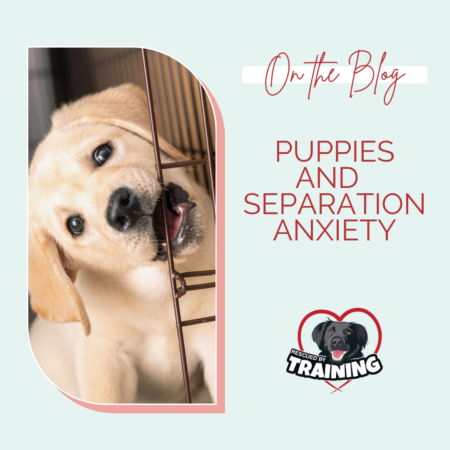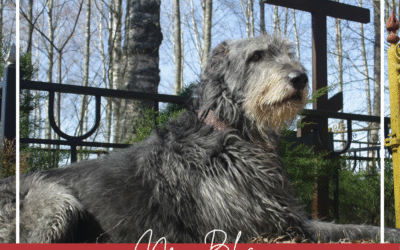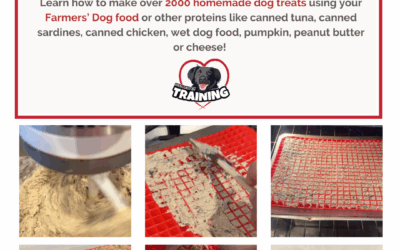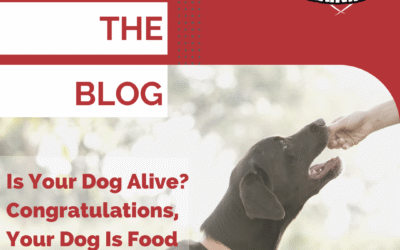Separation anxiety can be hard to properly diagnose, even in adult dogs. But with puppies, it can be especially confusing for new puppy parents to know if their puppy is experiencing separation anxiety or normal “puppy stuff.” A lot of normal things that puppies do are also a lot of the same indicators we look at when determining if a dog has isolation distress. And to make matters even more complicated, puppies inherently have a form of separation anxiety – vocalizing to reunite with mom, to get comforted or to seek warmth. So, it’s not really a surprise a new puppy may vocalize when they come to their new home. What do puppies do that could be normal puppy stuff or indicators of separation anxiety?
- vocalizing when alone
- potty accidents
- destruction
- not liking confinement
So how do we know the difference? There’s a few things we can do to try to figure out if this is normal puppy stuff or something more concerning.
Confinement anxiety: First, if the puppy is vocalizing or destroying their crate (or bedding inside the crate) then we first want to rule out confinement anxiety by properly crate training the dog. To do this properly takes time, so you may not be able to get a quick rule out on this right away. But, if the puppy isn’t comfortable being crated, it would be a normal response to howl, bark, dig and try to escape. To get a true read on the puppy’s comfort with alone time you want observe the puppy via video monitoring, not in the crate. You might be able to use a larger confinement area created with baby gates or x-pens that is puppy proofed but some puppies will still try to jump or escape or howl. This is why it’s so important to work with a qualified separation anxiety specialist, like me. Not all trainers have specialty training or are skilled at separation anxiety cases.
Housetraining: Before doing any alone time, you want to ensure the puppy is properly pottied. We also want to work on fully housebreaking the puppy. (Until a puppy has gone 3-4 weeks with loose management, free roaming in the home, with NO accidents, a puppy is not considered fully housebroken.) Also remember, puppies don’t have a lot of bladder and bowel endurance, so don’t expect an 8 week old puppy to hold it for more than 1-2 hours. Dogs with separation anxiety do have potty accidents but are normally 100% reliably housebroken when not left alone. If your puppy isn’t fully housebroken, potty accidents may be just that and not actually separation anxiety.
Destruction: Puppies get into things. They explore their environment with their mouth and in the process, often destroy stuff or get into things they shouldn’t. That’s why puppy proofing, enrichment and management is so important for puppy owners. But destruction can be a sign of separation anxiety, so we need to ensure the puppy is left in a puppy proofed area, with plenty of appropriate things to chew on and toys to play with. Destruction of exit points – doors, windows, door frames, window sills and floors or walls around those exit points, are common targets of destruction for dogs with separation anxiety. I had a client once who dug small holes in the hardwood floor hallway leading up to the front door, breaking her nails and ripping up her pads in the process. So for puppies, ruling out normal “fun” destruction is an important factor if you think your puppy has separation anxiety. What does fun destruction look like? Check out this video.
If you’re just not sure, I recommend people give their puppy a “soft intro” to alone time in a safe, controlled way, meaning introducing short absences where the puppy is being monitored via video while you’re away and return before the puppy starts vocalizing or showing any signs of stress. It’s incredibly important we don’t just let puppies “cry it out,” as this can have grave consequences for their emotional wellbeing and for your relationship with your new puppy. If your puppy doesn’t have separation anxiety, then you’ve gradually introduced them to safe absences (well done!) but if it turned out to be separation anxiety, that work would serve as the early steps in helping the puppy overcome separation anxiety, so there wouldn’t be any wasted effort.
If you’re not sure or need more guidance, set up your initial assessment today!
Also, be sure to check out my self-paced Separation Anxiety Foundations course.
Happy training!
![]()




